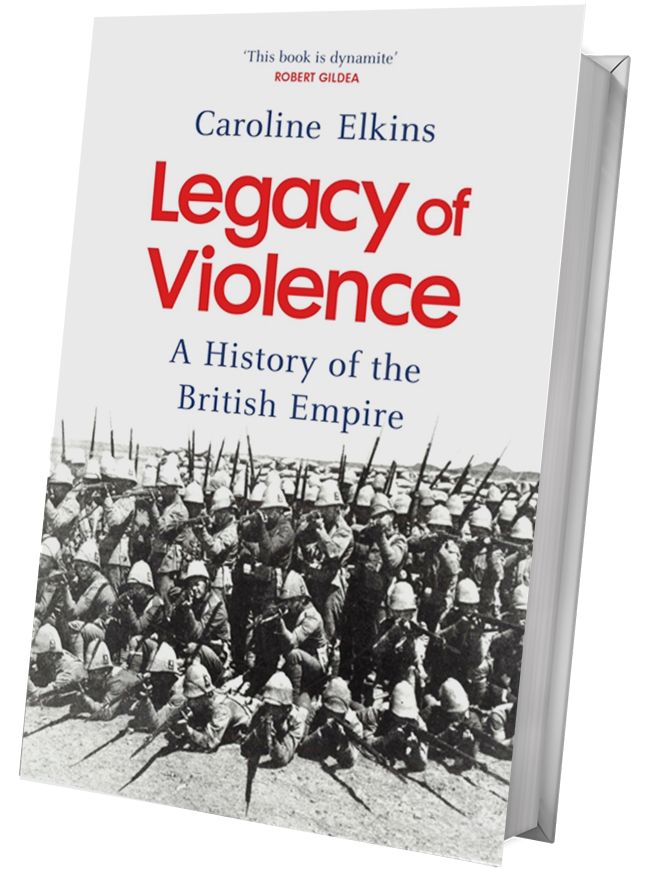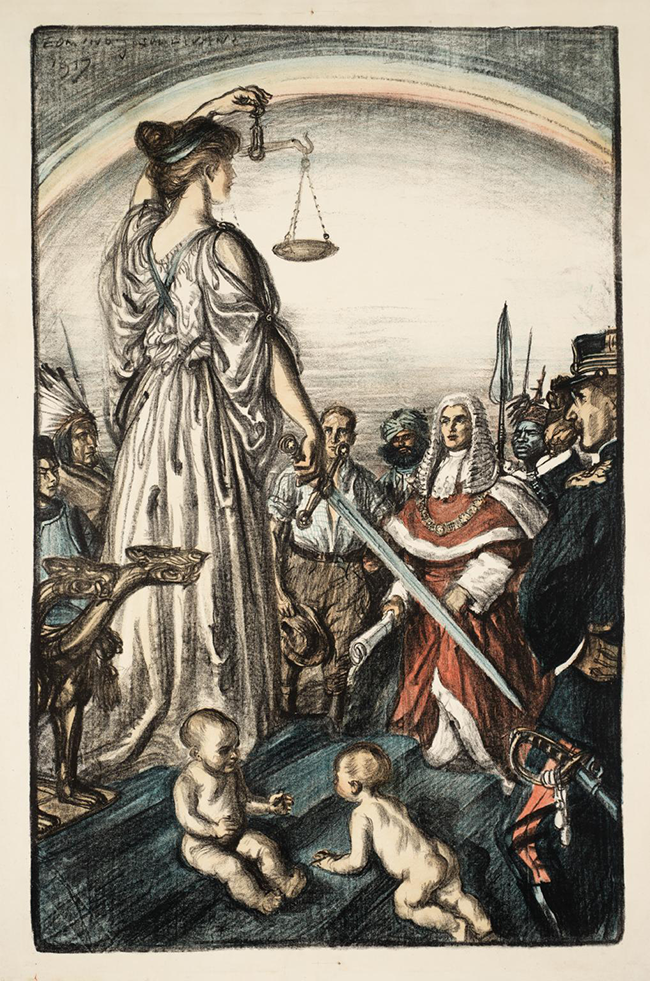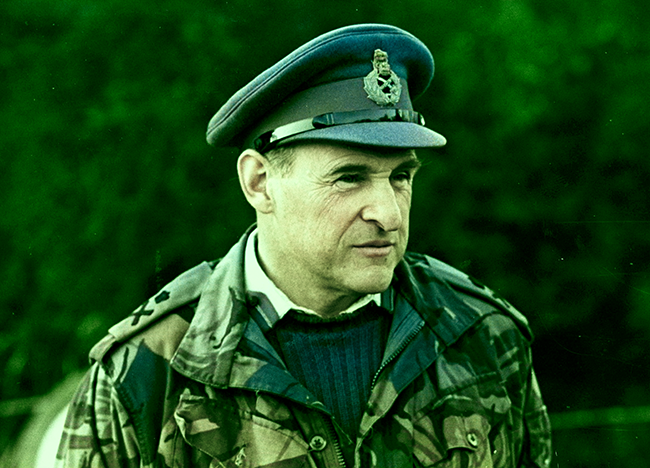25 May 2023 Edition
The legalised lawlessness of the British Empire
Léirmheas leabhar — Book review

• Munster Fusiliers regiment of the British Army in South Africa c.1900, features on the cover of this essential read
Legacy of Violence – a History of the British Empire
By Caroline Elkins
Published Bodley Head, London
• • • • • • • • • • • • • • • • • •
In the days before the coronation of Charles III, indigenous leaders and other representatives from 12 Commonwealth countries, former British colonies, issued a joint call on the new monarch to formally apologise for British imperial crimes and to make reparations by redistributing the wealth of the British crown and returning artefacts and human remains to their rightful owners.
Whatever the personal opinion of Charles III may be, there is not the slightest chance that the current British government will permit any such dramatic break from the imperial past. For this is the same government that is pushing forward with legislation designed to shield members of the British crown forces from accountability for their actions in their Irish war. The Northern Ireland Troubles (Legacy and Reconciliation) Bill follows in the long tradition of what Caroline Elkins describes in this book as the British Empire’s ‘legalised lawlessness’. While posing as the liberal guardians of law and justice, British imperialists have used laws to facilitate the commission of crimes, to cover them up, to protect the perpetrators and, very often, to destroy the evidence.
Let no-one think that this latest history of the British Empire has no contemporary relevance. On the contrary, it is bang up to date. As Elkins makes clear, the promoters of Brexit harked back to the Empire, holding out the prospect of a revival in a new form, with the British Foreign and Commonwealth Office openly talking of ‘Empire 2.0’ and Theresa May romancing about ‘Global Britain’.
The real Global Britain of Empire days was of course built on piracy, slavery, genocide, exploitation and, crucially, racism. To justify their inhuman treatment and ruthless economic exploitation of conquered peoples, the British imperialists had to regard them as sub-human or lesser humans, at best children, at worst savages. The British were not alone in this, but their empire was by far the largest and they, above all, clothed their iron fist in a velvet glove, posing as God-fearing, law-abiding benefactors of the lesser races in what Elkins calls ‘liberal imperialism’.
The book is a magnificent achievement based on a mountain of research (86 pages of notes!) and a detailed, yet panoramic view across the many countries, territories and populations that made up the British Empire. It follows the thread of ‘legalised lawlessness’ around the globe and links Ireland, India, Palestine, Malaya, Kenya, Aden, Cyprus, and more. It focuses on the 20th century as the Empire was, apparently, at its height immediately after the First World War and as it fought numerous counter-insurgency wars, was revived again after the Second World War, before its terminal decline.

Of the Black and Tans and Auxiliaries, Elkins writes, “Ireland and the men who enforced Britain’s rule of law were no exceptions to what their counterparts had been doing in the empire for years”. And what they would continue to do for decades. A particular strength of this book is how it follows the British military officers and administrators from one part of the Empire to the next. After their reign of terror in Ireland, many Black and Tan and Auxiliaries, led by their supremo General Henry Tudor, went to do the same in British-occupied Palestine. One of them, Douglas Duff, wrote:
“Mentally I suppose we were still living in the great days of Empire… To us, all non-Europeans were ‘wogs’, and Western non-Britons only slightly more worthy.”
The disastrous British ‘mandate’ in Palestine prepared the ground for Zionism and the Israeli apartheid of today, though they came into conflict with the Jews as well as the Arabs. But it was the Arabs who were most ruthlessly suppressed during the Arab revolt of the 1930s. One of the leading British terrorists was the RAF’s Arthur ‘Bomber’ Harris whose speciality was dropping bombs on Arab villages, a foretaste of his mass killing of civilians in German cities a few years later. The social life of British officers in Jerusalem is described by Elkins:
“When British security forces weren’t wiping out Arab rebels and repressing civilians – or recovering from local hazards like sand fly fever, malaria and typhoid – social life and leisure were top priorities... Heavy drinking was a favourite pastime, sometimes followed with a good dust-up in a local souk or café, where Arabs were beaten and killed for sport.”
But if British terror in Ireland was replicated elsewhere in the Empire, so was Irish resistance; for example, Elkins mentions the influence of Terence MacSwiney’s death on hunger strike in 1920 and Dan Breen’s book ‘My Fight for Irish Freedom’ (1924) on India’s revolutionaries.

• War propaganda poster from 1917 portraying the British Empire as the figure of Justice
Along with British terror went the piety and hypocrisy of ‘liberal imperialism’ and the myth of the ‘civilising mission’ of the British. Lionel Curtis was a key architect of the Anglo-Irish Treaty of December 1921 and a lifelong propagandist for the Empire which he longed to reshape in federal form so it could survive. He once wrote:
“If Christ came back to earth, where, in the present day, would he find that his precepts were best being practised? The British Commonwealth.”
The book is excellent on the economic and monetary exploitation of the Empire, rubbishing the claim that it was more of a burden on Britain than anything else. In this regard and in others, the record of the post-war Labour government is shameful. Yes, it set up the NHS, but it also continued oppression and exploitation across the Empire. Its Foreign Secretary Ernest Bevin was described as “an old fashioned imperialist, keener to expand than to contract the Empire”.
The catastrophic partition of India, the last act of the British Raj, with millions dying, is so well described by Elkins that it is worth quoting:
“The Raj’s divide and rule policies produced a chemical-like reaction, shattering long-standing traditions of co-existence and interacting with local personalities who had their own ambitions, passions, and allegiances. It was another liberal experiment in empire gone horribly wrong, and on a scale so epic that once history’s chain of contingent events combusted, no-one could contain it.”

• Caroline Elkins first book exposed the horrendous ordeal of the people of Kenya, leading to landmark legal actions that brought imperial crimes to London courtrooms
Divide and rule had also been the tactic in Palestine, shattering age-old co-existence. Of the Empire’s role, a former British Palestine policeman wrote, “The whole of the troubles in the Middle East which have affected the world since 1948 can be laid fairly and squarely at Britain’s door.”
After the defeat of fascism in 1945, there was the potential for a new era of national self-determination and the freedom of formerly oppressed peoples. But the USA’s pursuit of global domination and the Cold War dashed that hope. As Elkins says, “Anti-Communism trumped anti-imperialism, and the United States threw its weight behind bolstering its allies, which included Britain and France…” This was ominous for millions of people in Africa and Asia who were to suffer many more years of British and French colonialism, with US backing.
The book deals devastatingly with the network of killers and torturers, those who did the dirty work and those who covered up for them in colonial capitals and in the heartland in London at the end of Empire in the ‘50s and ‘60s. This was seen in concentration camps, torture centres, and forced movements of populations into military controlled villages in Malaya and Kenya and on a smaller scale in Aden and Cyprus. Elkins the historian made history herself when her first book ‘Britain’s Gulag: The Brutal End of Empire in Kenya’ exposed the knowledge and responsibility of British governments for the horrendous ordeal of the people of Kenya, leading to landmark legal actions that brought imperial crimes right back to their source in London courtrooms.
It is in Kenya that the British policy of destroying the evidence and protecting the guilty is best documented. As they prepared to withdraw, the British set up Operation Legacy, a system to select official records for retention or destruction. Masses of them were sent to England and many were ‘re-discovered’ during the Kenyan legal actions 2011-2015, leading to the full exposure of the British regime.

• Frank Kitson
One of the key British Army officers in Kenya was Frank Kitson who had also operated in Malaya, Cyprus, Oman, and Aden. He came to Ireland in the early ‘70s and, as a general, promoted counter-insurgency methods, including the use of loyalist paramilitaries as ‘counter-gangs’. Thus began a decades long campaign of terror and collusion, the story of which continues to unravel and which is far from yet fully told.
A cohort of Kitson in the North was MI5 agent Jack Morton, a veteran of India, Malaya and Aden and he gave a stunning insight into the imperial mindset:
“It dawned upon me, and became deeply ingrained, that the British were the rulers of India and that the Indians were a sort of immature, backward and needy people whom it was the natural British function to govern and administer. It was inspiring to realise that I was born into this splendid heritage and that to be British was to be a superior sort of person.”
Is such thinking extinct? Far from it. Elkins quotes Tony Blair’s foreign policy advisor Robert Cooper, a cheerleader for the Iraq war and champion of the neo-liberal world order. Referring to today’s ‘superiors’, the US and European elites, Cooper wrote, “Among ourselves, we keep the law but when we are operating in the jungle, we must use the laws of the jungle.”
This book is absolutely essential reading.
• Mícheál Mac Donncha is a Dublin City Sinn Féin councillor




